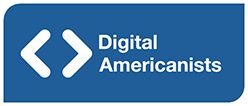Dear past, current, and future members,
We are happy to announce that the Digital Americanists have found a new board. Beginning September 2017, the leadership of DA will be:
Stefan Schöberlein (President) is a PhD candidate in English at the University of Iowa, the managing editor of the Walt Whitman Quarterly Review, and a research assistant for the Walt Whitman Archive. His work has been published in journals like Digital Scholarship in the Humanities, American Literature, and the Journal of American Studies.
Kevin McMullen (Vice-President) is a PhD candidate at the University of Nebraska-Lincoln, and a senior assistant editor at the Walt Whitman Archive. He is also a co-founder and editor of Fanny Fern in The New York Ledger, a project working to digitize the newspaper columns of nineteenth-century American writer Fanny Fern.
Stephanie M. Blalock (Secretary/Treasurer) is a Digital Humanities Librarian in the Digital Scholarship and Publishing Studio, at the University of Iowa Libraries. She is the Associate Editor of the Walt Whitman Archive, the Walt Whitman Quarterly Review, and The Vault at Pfaff’s. She is the author of “Go to Pfaff’s!”: The History of a Restaurant and Lager Beer Saloon, a peer-reviewed digital edition published by Lehigh University Press and The Vault at Pfaff’s, and she has also published several essays in Walt Whitman Quarterly Review. Her research focuses on Walt Whitman and Pfaff’s Beer Cellar and the reprinting and circulation of Whitman’s short fiction.
The new board looks forward to helping share and facilitate discussions of the exciting digital work happening in the field of American literature and culture around the world. Stay tuned to our website and social media channels for more information about upcoming DA events.
We would like to close by thanking Matthew Wilkens, Ryan Cordell, and Matthew Lavin for their years of dedication to the Digital Americanists.
On that note, and fully embracing our collective Whitmanian bias: “Ya-honk!”
